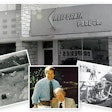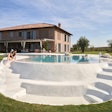You've seen them — those newspaper or magazine articles about other spa and pool retailers with their tips on choosing the right hot tub or how they raised thousands of dollars for charity. They're the businesses that get publicity, make the news. You wonder how they do it. More than that, you wonder how you can do it.
It's no mystery. Thousands of businesses like yours get press every day in newspapers and magazines, and on radio and television. Some are approached by reporters working on a feature in their area of expertise, or they may be contacted if they can contribute to a news story when a fire, flood or other hard news happens. But smart business owners know that if they wait for the media to contact them, they may never make it into print or onto the airwaves, so they reach out for that attention themselves. You can, too, when you know what makes a good story and how to work with the media.
In the first of this two-part article, you'll learn why positive publicity is important, and what makes a good story. In part two (coming in September), you'll find out how to form relationships with editors and reporters, and how to give professional interviews.
IT'S WORTH IT TO YOU
The credibility you gain from one article or radio talk show can be worth more than a week's exposure from the most expensive ad. Sure, that ad may announce your newest shipment of luxury hot tubs, but if readers aren't already in the market for that, they're likely to turn the page. However, an article in which you talk about pool safety and children may prompt someone to call your business.
"Positive publicity does more to enhance your reputation and raise your visibility as a business than almost anything else," says Erik Peterson, public relations consultant with Reis, Endicott, Peterson in Seattle.
But that publicity isn't exactly free. "A company that is interested in increasing its visibility has to spend time and money to achieve that end," he continues. Though a newspaper won't charge (or pay) you for an article, your time spent pursuing reporters and talking with them costs you money, whether you go at it alone or hire someone like Peterson.
If you choose a professional, consider a freelance publicist who may charge less than a full-service agency. For recommendations, call your local media, an established public relations firm (ask them who they hire), or the local chapter of a public relations organization (like the Public Relations Society of America, prsa.org) or a writers' and journalists' organization (such as the Society of Professional Journalists, spj.org). If your budget is limited, you can to try to do it yourself. Look for public relations seminars offered at trade shows, by your local press association, community college or public library.
ADVERTISING VS. PUBLICITY
An upcoming sale on pool chemicals is not news to a reporter, but he might be interested in a story on how to avoid accidents in the hot tub or sauna. An article on the outdoor pool covers you carry may not be worthy of the newspaper's space, but one on how to choose the best pool shape for your home's architecture and overall property could be. Get the idea?
The most important thing is the story you tell, not the products you sell. The press is jaded and guarded when it comes to covering businesses. They don't want an infomercial or an advertorial. These only turn them off, and readers often ignore them.
Instead, portray yourself as an expert, a source of information, and they're more likely to seek you out. The more you can tie your story to the interests of those reading the publication the better. All that really matters is that your company is mentioned. Other than that, the size of the mention makes little difference.
Articles and interviews about your store should inform and enlighten readers, not just massage your ego and push your products. Ask yourself what you can offer the public. When it comes to your business, news is what benefits others, whether that's your knowledge of the industry, your experience as a business owner or your contributions to the community.
WHAT MAKES A GOOD STORY
This is the fun part — to come up with creative ideas that attract reporters and respond to their needs to serve their readers, listeners and viewers. But it's also challenging because what you'd like covered may not be what the media want.
Simply put, a good story is what any particular newspaper, radio or television station says it is — it's what sells print and airtime. But it's also what the public wants to know. Often, the reporter's definition of a good news story differs from that assumed by people on the other side of her keyboard or microphone.
Therefore, read, listen and watch. Study articles about and interviews with other business owners, within all industries, and take note of what they focus on. "That's the trick to getting publicity," says Peterson. "Don't concentrate on your own message. Instead, learn what the publication or station is interested in and then adapt your message to that."
Generally, the media look for two kinds of articles and interviews from and about business owners: news and feature stories.
• News stories. These relate events that are happening now. Stories focus on who, what, when, where, why and how. Topics may cover:
Crises and conflicts. Your business survived a fire and re-opened at a new location.
Surprises. Economists predicted a slow winter season, but your sales increased 50 percent during November and December.
Major improvements. Your company's newest location increases the area's real estate values. Or, because of your business expansion, other companies in the area are enjoying increased business.
Community involvement. For your local Chamber of Commerce, you give a speech on database marketing or you offer a workshop on the health benefits of hot tubs and saunas.
Charitable contributions. You collect donations for a food pantry, or you donate public swimming pool time for at-risk teens.
• Feature stories. These describe your opinions, or industry trends or offer how-to hints for readers. Stories are often about:
Community interest. You have views about the use of alternatives to swimming pool chemicals. Or, you've developed an innovative approach to hiring the best sales staff.
Expert information. You know all about the latest hot tub innovations, or you can explain how to adhere to the laws regarding firing someone.
Problem solving. You have ideas about how to prevent check fraud or internal theft. Or, you have figured out how to attract more business with creative customer service.
Trends. You know about the newest spa chemicals or about the latest in pool design.
Business profiles. Your store is celebrating its 75th year and there's a reason for your success.
TAKE THE NEXT STEP
Once you know the story you want to tell, you'll need to know whom in the media to contact and how to present yourself to them. That's what we'll address in part two of this article. Whether a reporter interviews you or you hire someone to write the article, the positive publicity you generate about your business can only attract more clients.






































